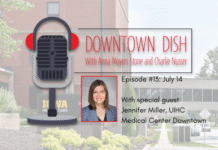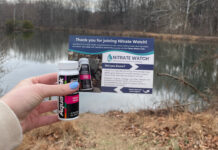By Gigi Wood
About 50 residents of University Heights, a town of about 1,000 people west of Iowa City, gathered Jan. 26 to discuss their concerns with future development.
The meeting, facilitated by the Johnson County Council of Governments (JCCOG), took place at the University Athletic Club, 1360 Melrose Ave. The University Heights City Council in July voted down a site plan for a development at 1300 Melrose Ave., where the St. Andrew’s Presbyterian Church is located.
The church bought land on the west side of Iowa City to expand and Jeff Maxwell of Maxwell Construction stepped in wanting to build One University Place, a two-building mixed-use development with high-end condominiums.
A petition against the project was filed, forcing a super-majority city council vote to approve it. Critics of the project said it is too high density, does not fit in with the city’s comprehensive plan, will create too much traffic and destroy the community’s unique character.
After the project was turned down, Mr. Maxwell said he would return with a new project. A new design plan is reportedly being prepared for the city, but Councilor Stan Laverman said he has not seen it and is not sure who is submitting it.
University Heights asked JCCOG to facilitate last week’s meeting to help the city upgrade its comprehensive plan to address residents’ concerns about future development. The council will discuss the findings at its next meeting on Feb. 9. The comprehensive plan guides long-term development decisions for the city.
“We want to hear your concerns, both in general for the city of University Heights and specifically about this property (University Athletic Club) and the church property,” said John Yapp, JCCOG’s executive director.
The University of Iowa’s University Facilities Corp. bought the University Athletic Club after the 2008 floods, to use as meeting space. University Heights zoning regulations will apply to the building as long as the UI uses it for commercial or business purposes. If the UI changes the building’s use to academic, the school will no longer answer to the city’s zoning rules, Mr. Yapp said.
“From what we understand, a rezoning application is pending (for the church site),” he said. “And additional development proposals are likely in the future. This is largely due to University Heights’ location, in close proximity to University Hospitals (and Clinics) and it’s becoming the center of the Iowa City area.”
Residents were separated into groups and asked several questions about the community including likes and dislikes and what uses were appropriate for the church property as well as other commercially zoned properties in town.
The groups were most concerned about development density, size of buildings, light and odor pollution, increased traffic, decreased property values and absentee owners.
A few suggested keeping the church building and converting it into a community center or a coffee shop. Several residents said they are not concerned about increasing the city’s tax base through adding commercial or high-density housing developments.
“It’s not like we’re losing anything,” one resident said, citing the church’s tax-exempt status.
Any commercial businesses that move into University Heights should serve the needs of residents, one group said.
JCCOG plans to submit an application to the state to fund a sidewalk improvement in University Heights. If approved, about $215,000 will be provided to University Heights to help pay for the $270,000 cost of widening the Sunset Street sidewalk from Melrose Avenue to Benton Street.
For more information about the comprehensive plan, visit www.university-heights.org/CompPlan10/index.html. The page offers a survey for residents to voice concerns. The deadline is Feb. 3. CBJ




